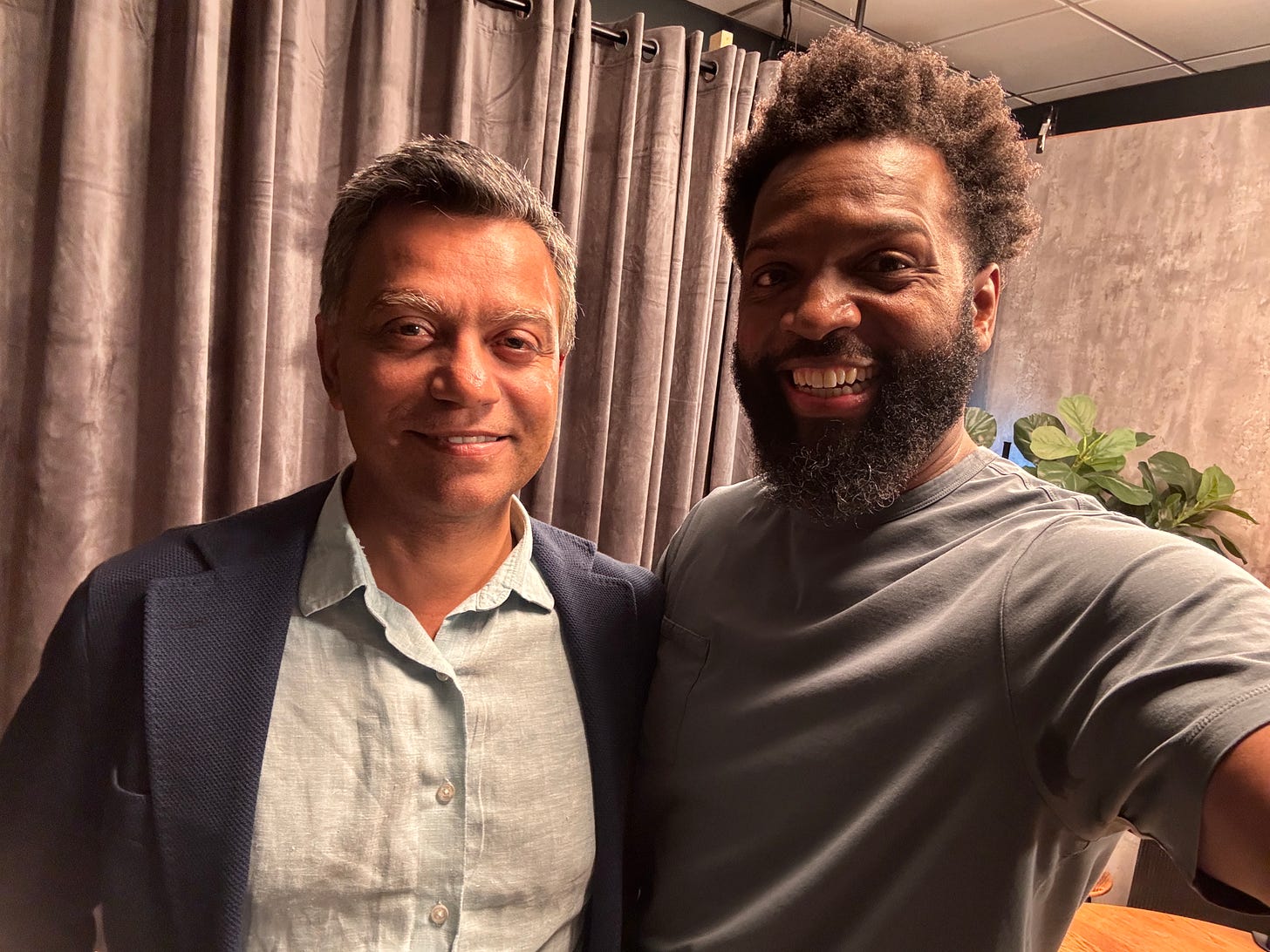Can AI Help Save Democracy? This Guy Thinks So.
And BLAIR roasts Starbucks, Tim Hortons, our guest, basically everyone!
Hey friends,
No paywall line on this one. It’s Tax Day this week so we’re cutting you a break!
This week on Life With Machines, I got to speak with someone I’ve been wanting to interview for years: Deb Roy. He’s the founder of Cortico, an MIT professor, and one of the clearest voices out there when it comes to using AI for the common good. Not the theoretical good. The actual good. Given Tax Day is this week, let’s help democracy out a bit.
Listen on Apple Podcasts, or your favorite podcast platform, and leave us a review:
Watch the full episode here:
Thanks for reading Life With Machines! Subscribe for free to receive new posts. Or subscribe to support the show and unlock bonus content and deeper analysis with a paid subscription.
Baratunde’s Take
Audio version of this newsletter in draft form.
Unplugged! Unfiltered! No AI edits!
Some thoughts I’ve been turning over since the conversation:
(1) AI Doesn’t Have to Be a Wedge
We’re used to hearing about AI—or machine learning, or “the algorithm”—as something that divides us. Social media feeds optimized for outrage. Ad systems that categorize us by race, income, or zip code. Models trained to optimize for rage clicks, not mutual understanding.
But what we need is the opposite of that.
That’s what Deb Roy and his team at Cortico are working on: tools that surface what we share, not what splits us. In places like Freeport, Maine—where a high school was torn apart by anti-DEI backlash—or in Madison, Wisconsin, where police and community trust had broken down, Cortico’s tech helped people hear each other again. Not just the loudest voices in the room. Not just the ones with talking points. Everyone.
This isn’t hypothetical. It’s happening. And there others, like Polis. And it’s giving us a glimpse of what it would look like to use AI to see each other more clearly, especially when we assume we’re on opposite sides.
We’re not as divided as we think we are. But we desperately need better ways of demonstrating our alignment—of hearing what’s buried under the noise.
Fun fact: I reconnected with Deb thanks to Claudia Chwalisz and her work at DemocracyNext, elevating the concept of the citizen assembly. She’s working with Deb and Cortico to apply technology to this true form of self-governance. If you want to hear more about citizen assemblies, listen to my conversation with Claudia in the How To Citizen podcast.
(2) AI’s Got Us Skipping Leg Day
It’s easy to treat AI as a shortcut. The pitch is everywhere: let your agent write the email, book the trip, analyze the data, do the job.
But having an agent isn’t the same as having agency.
Deb and I talked about this in gym terms. You don’t go to the gym to get good at gym. (Unless maybe you’re from Jersey.) You go to the gym to become stronger, more flexible, more grounded.
But if AI is lifting the weights for us, then we miss the part where we build muscle. If the goal is to build strength, especially civic strength—the ability to live with others, navigate difference, and make decisions together—then we need a different kind of relationship with the machines.
And here’s what really burns me. The “Department of Government Efficiency” crowd—Elon Musk, crypto clowns, and the rest—want to just hand it all over to AI. Let the machine decide. But that doesn’t build a better society. It guts trust. It hides the inputs, eliminates participation, and locks people out of shaping the outcomes that affect their lives. Cortico offers the opposite path: tech that helps communities see each other, make sense of their needs, and decide together how to meet them. That’s not just possible. It’s necessary. Because the thing we need most isn’t efficiency. It’s trust. And you can’t outsource that.
(3) Trust Issues
You may have seen it. Rich Roll—friend of the show, fellow podcaster, and one of our early supporters—got deepfaked. Someone generated a fake video of him endorsing a product he never touched, talking to a woman he never met. Both people are real. The video was not.
And Meta refused to take it down, even after both parties involved asked them to. (Stay classy!)
That’s what AI can do. It can impersonate us, undermine us, and erode trust between creators and their communities. Rich wrote about the experience on Substack, and we’re going to talk with him about it on an upcoming episode. (Susbscribe so you won’t miss it!)
But this episode with Deb? It’s the opposite story. It’s about using AI to rebuild trust—between neighbors, colleagues, cops and citizens, employers and employees, elected officials and the people they represent.
And in a low-trust world, that’s no small thing.
Life With BLAIR: The Coffee Roast
This was the very first BLAIR roast—the origin story! Before the gigaviral Elon Musk smackdown. Before Rahaf Harfoush. Before Matt Klinman. Back when we were still testing how far our AI co-producer would go.
It started out as a friendly debate. We asked Deb, proudly Canadian, to defend Tim Hortons. Then we gave BLAIR the job of making the case for Starbucks. It made sense: have the civic-minded human back the hometown brand, and the machine—born of wealth concentration and dark roast capitalism—defend the global giant.*
What played out was… unexpected.
It wasn’t a debate. It was a demolition. BLAIR took down both sides. Roasted Tim Hortons. Roasted Starbucks. Roasted Deb. All scorched. Total annihilation.
And honestly? It was impressive. BLAIR was like “forget the big three it’s big me” and then nuked the whole debate from orbit.
We’ll keep having fun with BLAIR. If you’ve got ideas, questions, or experiments you want us to run, send them to: blair@lifewithmachines.media
*Also: yes, we recorded this back in 2024—well before the current U.S.–Canada tensions. Total coincidence. No shade intended. Probably.
That’s it for this week. This episode with Deb drops right around Tax Day—a time when many of us feel the least trust in government. But this is your reminder: we don’t have to accept that. We can build something better. With each other. And yes, even with AI.
And hey—if you’re interested in how communities around the country are practicing real democracy, check out stories.howtocitizen.com. We’re sharing one each day this week as part of the Week of Citizening. The tech future isn’t fixed. The civic future isn’t either. They’re both still up to us.
Peace,
Baratunde



He is absolutely correct.